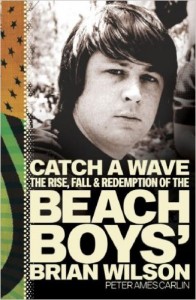Peter Ames Carlin, The Rise, Fall and Redemption of the Beach Boys’ Brian Wilson (2006)
Just finished this and, as a Brian Wilson cultist, I’m ready to rank it among the best books so far about him or the Beach Boys for at least four reasons:
1) It’s got a happy ending. Carlin hammers home the recurring theme that every stage of Wilson’s life is affected by a dynamic creative/business collaborator for better or (often) worse, then he leaves us with the clear impression that Wilson circa ’06 is in the hands of folks (wife Melinda being at the forefront) who equate his personal creative vision and personal happiness with financial success. And it’s about time, we sigh.
2) It frames the Beach Boys saga, with all of its familiar, sordid aspects, in the context of Wilson’s creative frustration. Carlin emphasizes that the perceived rejection of Wilson’s Smile material by the rest of the group, and eventually by radio and the buying public, played a major role in his late-sixties collapse. This wasn’t the only factor, of course, but it was a huge one, and Carlin doesn’t let us forget it.
3) It plays down the “heroes and villains” model so much Beach Boys writing drifts toward (and I’m not necessarily thinking Steven Gaines’ Heroes and Villains here, in which everyone’s a villain). The Brian vs. Mike concept, for example, is one that Brian fans eat for breakfast, and although Carlin is obviously on the Brian team (is anyone on the Mike team, come to think of it?), he goes out of his way to give us as sympathetic an image of Mike that a book aimed squarely at Brian fans could possibly give.
4) Carlin speaks the language of the true Brian Wilson faithful. This is perfectly OK because this ilk deserves a book that puts the music front and center, and while Carlin can and does talk about the music on its own merits with a critical eye, it’s shaded with the Church of Brian doctrine that while translations of the Truth may go awry (productions, arrangements, lyricists), Brian’s essential musical vision is 100% pure and reliable. Thus, The Beach Boys Love You is rightfully heralded, song-by-song, as a “darkly lovely” masterwork, Friends as “transcendentalist” (Carlin’s audience will know that he’s not just talking about nature and Thoreau here), and the unlikely 2004 miracle of Smile as a catalyst for redemption. You can’t believe everything you read, but because this is what most of us want to believe anyway, it sure feels nice.

